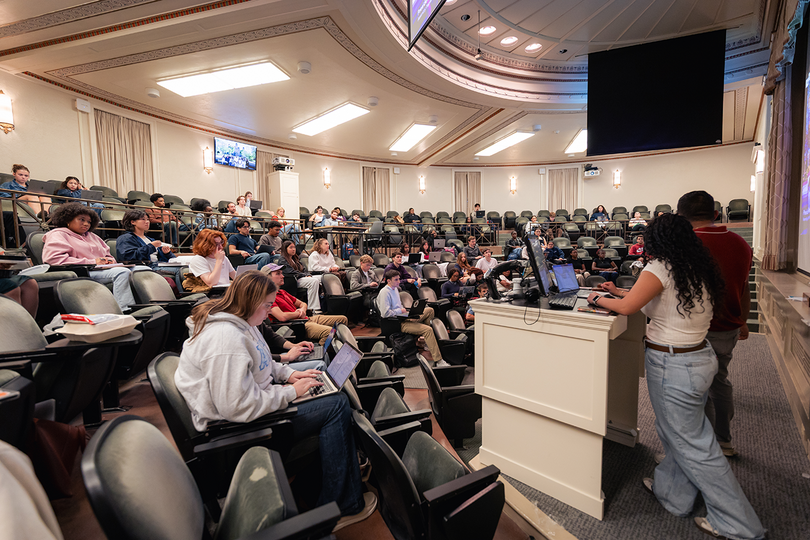SGA discusses Conduct Code updates to protest, hazing regulations

SU’s Student Government Association addressed updates to the Student Conduct Code on protesting and hazing regulations at their Monday night meeting. Aaron Hammer | Staff Photographer
Get the latest Syracuse news delivered right to your inbox.
Subscribe to our newsletter here.
Syracuse University’s Student Government Association addressed updates to the Student Conduct Code regarding protesting and hazing regulations during its Monday meeting.
The code’s language has gotten “stricter” in its sections regarding student protests and hazing, said Alani Henderson, SGA Student Advocate.
Last year’s code outlined the “unauthorized entry or use of University facilities” as a violation of the conduct code. The updated version expands the proximity of such an entry to include any SU student, staff or faculty’s “personal residence.”
The updated code also rephrases a previous violation that included intentionally disrupting or obstructing operations at SU. The new version puts more emphasis on blocking access as its own standalone violation rather than just an example of disruption.
Henderson credited these changes to a rise in campus demonstrations, saying SU is hoping to ensure there are “safe practices” on campus. She also said the university’s anti-hazing policy has gotten stricter, following Phi Kappa Psi’s hazing incidents in October 2024.
She highlighted the importance of students being aware of university regulations and recommends reading through each document rather than just signing them blindly, referring to the mandatory Student Conduct Code signature on MySlice.
“A lot of students end up in conduct charges because they don’t know what they’ve signed,” Henderson said. “They’re like, ‘Well, I didn’t know, and I didn’t know I agreed to this.’ Well, you did. You agreed when you signed, when you agreed to your terms.”
Henderson also presented the Campus Disruption and Demonstration Policy, clarifying the process of organizing an on-campus protest and all the regulations students must follow.
“We want proper channels to be available for those (protests) to happen, and so that if something is happening, they (SU) are able to know what’s going on,” Henderson said.
The policy, last updated in August 2024, requires demonstrations to be registered with the university at least 3 business days before the event. It also prohibits SU non-affiliates from hosting or organizing demonstrations on university property.
The guidelines also ban the use of unauthorized tents or other temporary shelter structures and the use of amplification within 50 feet of any building used for academic purposes without authorization from Student Engagement.
SGA said it intends to act as an “ally” for students wanting to protest, making sure they follow the rules and regulations determined by the university in a safe manner.
“These are new policies that we’re also trying to understand ourselves,” SGA President German Nolivos said. “Students should always have the right to always protest about any type of issues, but want to make sure that they do it safely.”
This week’s SGA meeting also followed a different format from its typical meetings. Rather than focusing on passing bills and systematic processes for the bulk of its time, SGA hopes its meetings will become a forum for students to discuss issues with various university departments.
By inviting different administrators and departments to the meetings, SGA aims to allow all students to use its meetings as an opportunity to bring their concerns to SU administrators and departments, Nolivos said
“Our job is to bring all of these concerns to the table, but sometimes it’s better to have students directly telling (their issues) to administrators,” he said.
This shift is still in the early stages, Nolivos said, with the SGA still finalizing its plans to host departments like Dining Services and SU’s Department of Public Safety as a part of future meetings.
Monday’s meeting included representatives from the Maxwell School of Citizenship and Public Affairs and the Newhouse School of Public Communications in Washington, D.C., presenting information on their respective study away programs. The representatives highlighted the internship search support and opportunities provided to students, along with the specialized courses and electives available in D.C.
Nayyera Haq, Assistant Dean of Maxwell in D.C., said the program is looking to expand even further, welcoming students from every major and track on campus.
Nolivos emphasized the importance of involving SU students in SGA meetings and hopes to create a more engaging atmosphere, he said.
“We’re trying to make a better environment for students, for them to have a space that they feel they can come to every Monday,” Nolivos said.





